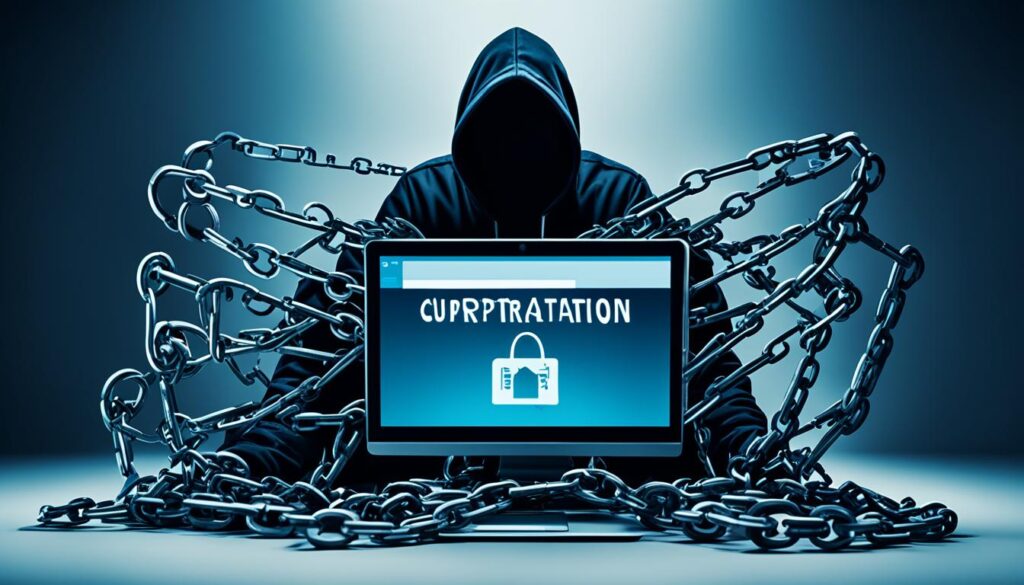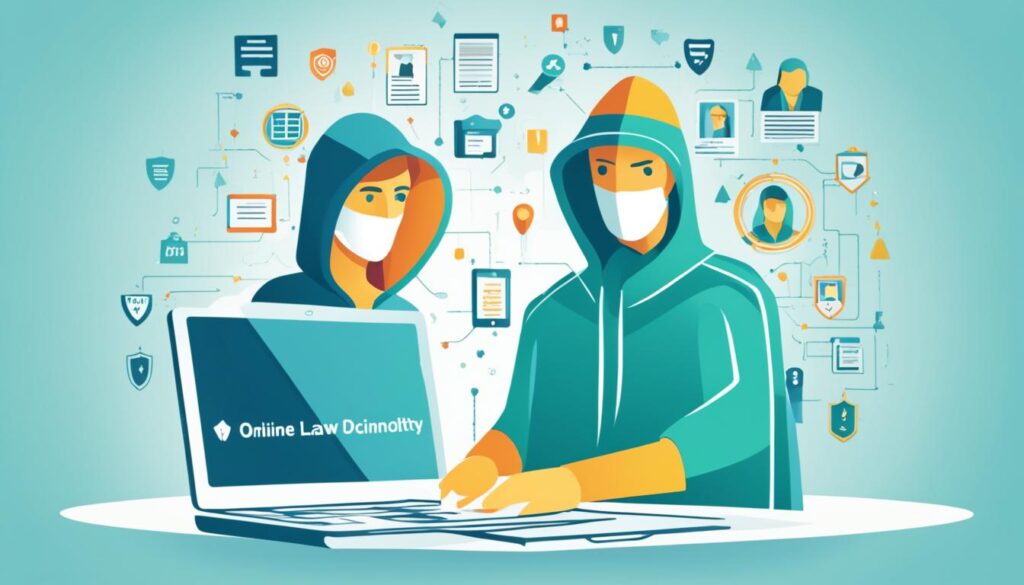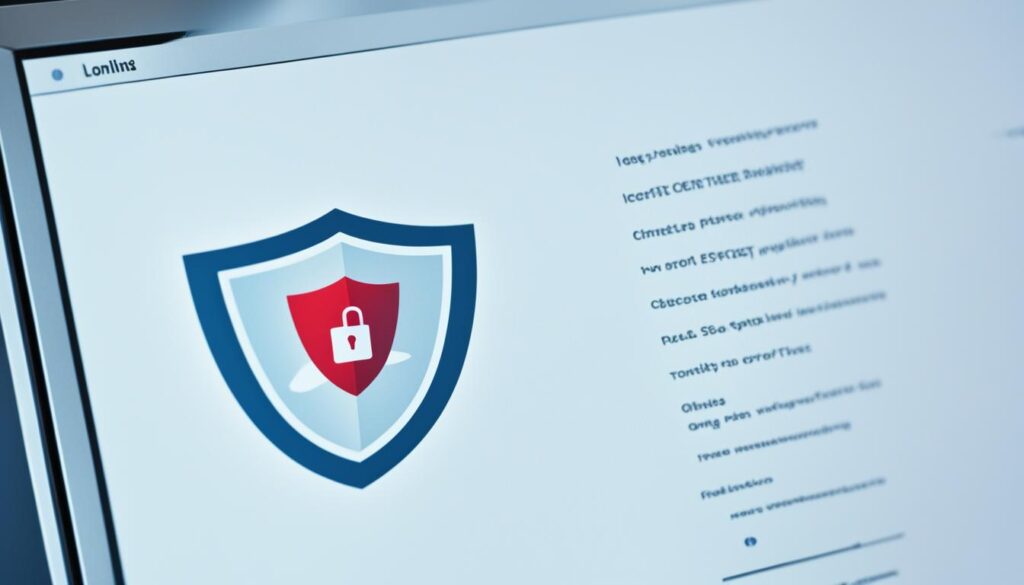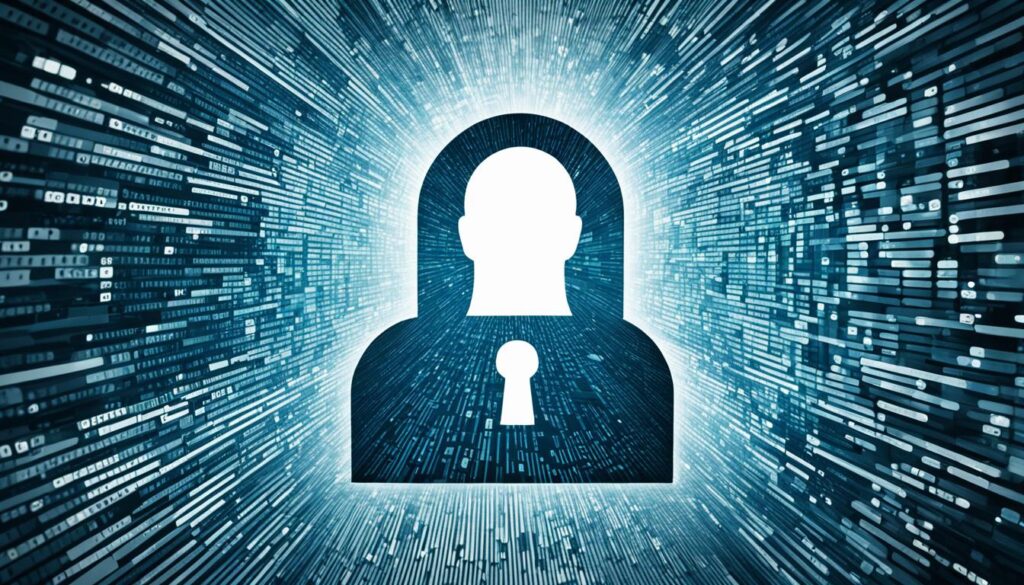Ever thought about how safe your online identity is? In today’s digital world, online identity theft and impersonation are big worries. They can harm your personal or business reputation. Just one click can lead to big problems, like a New Jersey woman who got 18 months in jail for pretending to be her ex on Facebook1.
The way we live, share info, and do business online has changed a lot. But, these changes bring new challenges to keep our online identities safe. Social media impersonation is a big issue now. It happens when someone makes a fake account using someone else’s name, photos, or info without okaying it2. This not only breaks the person’s right to their identity but can also lead to serious legal trouble.
This article will dive into the world of online impersonation, its effects on managing your reputation, and the laws around it. We’ll also share tips on how to protect your online identity and deal with online challenges.
Key Takeaways
- Online identity theft and impersonation are big threats to your reputation.
- For online impersonation, you could face civil lawsuits or criminal charges.
- Social media is a common place for online impersonators to strike.
- Good reputation management means knowing about impersonation laws and how to prevent it.
- Keeping your online safe with strong passwords and two-factor authentication is key to protecting your identity.
Understanding Online Identity Theft and Impersonation
Online identity theft and impersonation are big problems today. They involve making fake accounts or profiles to look like a real person or business online. People do this for many reasons, like wanting attention or to cause trouble.
Impersonators use smart tricks to fool people. They might make fake profiles on dating sites using someone else’s name and photos. Or, they could break into social media accounts to share embarrassing stuff3. Sometimes, they try to make money or scare people online.
Being impersonated online can really hurt. For people, it can damage their reputation and cost money. Businesses also suffer, as scammers might trick them into giving out money or important info3.
Online impersonation is part of social engineering. This is when people try to trick you into sharing secrets or making bad choices4. It’s important to know how to spot these tricks and stay careful online to protect ourselves.
If you think someone is pretending to be you online, act fast. Tell your friends, save screenshots for later, and ask social media sites to take down the fake account3. Being aware and taking steps to protect ourselves is the best way to fight against online impersonation and identity theft.
The Impact of Online Impersonation on Personal and Business Reputations
Online impersonation is a big worry for people and companies today. In 2023, the FBI got over 14,000 reports of scammers pretending to be government workers. These scammers stole around $400 million5. This shows how online impersonation is a big threat to our good names on social networks.
Cybersecurity experts see social media impersonation as a big problem. It’s covered by the 1998 US Identity Theft and Assumption Deterrence Act. This includes things like harassment, credit card fraud, and financial fraud6. It’s easy for scammers to make fake profiles and act like real people on social media.

Data breaches often lead to impersonation scams. A 2021 survey by Nationwide found 26% of people had fallen victim to such scams. This shows how fast impersonation scams are growing7. We really need strong ways to protect ourselves from these scams.
Businesses have their own problems with fake accounts. When scammers pretend to be top bosses, it can really hurt a company’s image. Fake business pages and ads can also trick customers and steal their info6.
To fight these issues, companies should keep training their staff and use technology to spot fake accounts. By being proactive, we can lessen the harm of online impersonation. This helps keep our online lives safe and our reputations intact in a world that’s more connected than ever.
Online Identity Theft and Impersonation Laws
In the United States, laws against online identity theft and impersonation vary by state and federal laws. The Identity Theft and Assumption Deterrence Act of 1998 made a new federal law about identity theft. The Identity Theft Penalty Enhancement Act of 2004 introduced “aggravated identity theft”8.
Many states have laws against impersonating others on social media. California, Texas, Mississippi, Hawaii, and New York have laws about Internet impersonation9. California, Arizona, and New York also make it illegal to impersonate someone online to get financial records.

Law firms often work on cases related to these identity theft laws. In Virginia, identity theft is a Class 1 misdemeanor. This means someone could face up to 12 months in jail and a fine of up to $2,50010. The punishment gets harsher if there are more victims or more money lost.
| Jurisdiction | Law | Penalty |
|---|---|---|
| Federal | 18 U.S.C. § 1028 | Up to 15 years imprisonment |
| Virginia | Class 1 Misdemeanor | Up to 12 months jail, $2,500 fine |
| California | Anti-cyberstalking law | Varies based on offense |
The FBI has been fighting identity theft hard. They recovered about $4.6 billion and got orders for over $78 billion in restitution over five years ending in mid-fiscal year 20138. This shows how serious online impersonation is and its effects on victims.
Legal Consequences for Impersonators
Impersonators can face serious legal trouble. In New York, pretending to be someone else can lead to up to a year in jail and three years of probation11. For worse cases, the punishment can be four years in prison and five years of probation11.
In California, online impersonation can be seen as a crime that can be charged as a misdemeanor or a felony12. If charged as a misdemeanor, you could face up to a year in jail and a $10,000 fine. If charged as a felony, you could get three years in prison and have to pay $10,000 in fines12.
At the federal level, impersonation crimes are taken very seriously. Under 18 U.S. Code Chapter 43, pretending to be a U.S. citizen or a U.S. officer can lead to up to three years in prison13. If you pretend to be a diplomat or an officer, you could face a 10-year sentence13.
To prove someone is guilty of online impersonation, prosecutors need to show four things: the person pretended to be someone else, they used digital means to do it, they wanted to harm or deceive, and they actually caused harm12. A lawyer might question these points or look into IP information and how search warrants were carried out11.
An impersonation conviction can have big effects. It can impact your job, your professional licenses, and even your immigration status11. You could also be responsible for paying back debts related to your crime. In some cases, victims might sue you for the harm caused by your actions.
Steps to Take When Facing Online Impersonation
If you’re a victim of online impersonation, act fast. Here are steps to help you deal with it:
- Conduct a thorough search to identify all imposter accounts
- Preserve evidence and document damages
- Strengthen your social media security
- Report imposter accounts to platforms
- Send DMCA takedown notices if applicable
- Report identity theft to law enforcement and the Federal Trade Commission
- Consider working with an experienced content removal attorney

Online impersonation can take many forms, like fake social media profiles and phishing scams14. To stay safe, use tools like Google Alerts and Social Mention to spot impersonation early.
If you think someone is impersonating you, save screenshots of what they did. This evidence is key for legal help and when you file complaints15. Remember, making fake online profiles can lead to serious legal trouble in some places15.
When you report to the police, know that they work with agencies like the FBI on identity theft cases16. The Identity Theft and Assumption Deterrence Act of 1998 made identity theft a serious crime16.
| Platform | Impersonation Policy |
|---|---|
| Strict policy against impersonations and fake usernames | |
| Generally doesn’t allow impersonations, with exceptions for parody, commentary, and fan accounts |
By taking these steps and staying alert, we can fight against the harm caused by online impersonation14.
Preventive Measures and Best Practices for Online Identity Protection

Identity theft is a big worry in our digital world. Every year, up to 9 million Americans have their identities stolen. In 2023, over 1 million reports were made to the Federal Trade Commission1718. To keep safe, it’s key to use strong security steps and be careful.
First, turn on two-factor authentication (2FA) for all your social media. This adds an extra safety layer, making it tough for hackers to get into your info. Change your passwords often, and use different ones for each account. Think about using a password manager to safely keep track of these complex passwords.
Watch your online presence closely. Be aware of how often your social security number is used, as about 23% of victims in 2020 saw their number misused19. Sign up for breach alerts to know about any data leaks on your accounts.
Checking your credit is also key to protecting your identity. Look over your credit reports often and think about freezing your credit with big bureaus to limit access to your info18. This makes it harder for thieves to open new accounts in your name.
- Use strong, unique passwords for all accounts
- Enable two-factor authentication
- Monitor your credit reports regularly
- Be cautious of phishing attempts
- Keep your devices and software updated
Keep up with the latest ways to protect your identity and think about getting autorenew packs for ongoing security. By doing these things, you can greatly lower your chance of falling victim to online identity theft and impersonation.
Conclusion
We’ve looked into how online identity theft and impersonation are big problems today. It’s important to stop these crimes in our digital world. With more deepfake videos and online scams, staying alert is crucial20. These crimes hurt not just people but also businesses, making us doubt digital marketing20.
Social media sites like Facebook are part of this issue. With 845 million users, people, especially students, spend a lot of time on it21. It shows why we need to know the laws. The U.S. has laws like The Identity Theft and Assumption Deterrence Act to fight these crimes22. States like California also have laws to protect our online privacy, like the Anti-Phishing Act22.
To keep our online lives safe, we need to learn about fair debt collection and the legal issues of pretending to be someone else online. We should always watch what we share online and use strong security20. By being proactive and knowing our rights, we can protect our online identities and keep our good names in this connected world.
FAQ
What is online identity theft and impersonation?
What are the common platforms for online impersonation?
How can online impersonation impact personal and business reputations?
What are some laws related to online identity theft and impersonation?
What legal consequences can impersonators face?
What steps should I take if facing online impersonation?
How can I protect my online identity?
Source Links
- Liability for Impersonating Someone Online – https://www.michalsons.com/blog/liability-impersonating-someone-online/9696
- How to Deal With Social Media Impersonation – https://www.minclaw.com/social-media-impersonation/
- Online Impersonation Explained – https://heimdalsecurity.com/blog/online-impersonation
- What is Social Media Impersonation? – https://www.bitdefender.com/cyberpedia/what-is-social-media-impersonation
- FTC Finalizes Government and Business Impersonation Rule – Caller ID Reputation® – https://calleridreputation.com/blog/ftc-finalizes-government-and-business-impersonation-rule/
- What is Social Media Impersonation? – https://www.bitdefender.com/cyberpedia/what-is-social-media-impersonation/
- What is online impersonation and how to prevent it – Red Points – https://www.redpoints.com/blog/online-impersonation/
- Identity Theft Under Consumer Protection Laws – https://www.justia.com/consumer/identity-theft/
- Some States Criminalize Internet Identity Theft – https://bicklaw.com/SomeStatesCriminalizeInternetIdentityTheft.htm
- Identity Theft in Virginia | Thomas M. Wilson, Attorney at Law – https://www.tmwilsonlaw.com/identity-theft
- Second Degree Criminal Impersonation: NY Penal Law 190.25 – https://www.nydeskappearanceticket.com/second-degree-criminal-impersonation-ny-penal-law-190-25.html
- Is It Illegal to Impersonate Someone in California? – https://www.eastbaylawpractice.com/blog/2023/august/can-you-go-to-jail-for-impersonating-someone-onl/
- Federal Criminal Impersonation (Personification): Laws, Charges, Defense – https://www.lvcriminaldefense.com/usc/false-personation/
- Someone is pretending to be me online! What to do? – https://verpex.com/blog/privacy-security/someone-is-pretending-to-be-me-online-what-to-do
- Online impersonation laws – ReputationDefender – https://www.reputationdefender.com/blog/privacy/online-impersonation-laws
- Identity Theft – https://www.justice.gov/criminal/criminal-fraud/identity-theft/identity-theft-and-identity-fraud
- How to Protect Yourself from Identity – https://www.webroot.com/us/en/resources/tips-articles/how-can-i-protect-myself-from-identity-theft-online
- Identity Theft: What It Is, How to Prevent It, Warning Signs and Tips – NerdWallet – https://www.nerdwallet.com/article/finance/how-to-prevent-identity-theft
- Help Prevent Identity Theft | Office of the Attorney General – https://www.texasattorneygeneral.gov/consumer-protection/identity-theft/help-prevent-identity-theft
- What’s Identity Theft and Online Impersonation? | Smart Protection – https://www.smartprotection.com/articles/what-is-identity-theft-and-online-impersonation-understanding-and-mitigating-cyber-threats
- Identity Theft on Social Networking Sites: Developing Issues of Internet Impersonation – https://digitalcommons.tourolaw.edu/cgi/viewcontent.cgi?article=1472&context=lawreview
- Understanding the Importance of US Privacy and Identity Theft Laws – https://www.isaca.org/resources/news-and-trends/industry-news/2021/understanding-the-importance-of-us-privacy-and-identity-theft-laws

